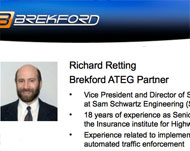Article from: www.thenewspaper.com/news/41/4136.asp
6/28/2013
Richard Retting Becomes A Paid Red Light Camera Lobbyist
Redflex Traffic System pays Richard Retting to lobby California legislature on behalf of shorter yellow times and red light cameras.
 The man most responsible for the spread of automated ticketing in the United States is once again profiting from his advocacy. Richard Retting, the former Insurance Institute for Highway Safety (IIHS) analyst once dubbed the "father of red light camera in America" last month became a paid advocate for Redflex Traffic Systems as it lobbies the California legislature to block an engineering improvement that could cut deeply into the Australian firm's revenue stream.
The man most responsible for the spread of automated ticketing in the United States is once again profiting from his advocacy. Richard Retting, the former Insurance Institute for Highway Safety (IIHS) analyst once dubbed the "father of red light camera in America" last month became a paid advocate for Redflex Traffic Systems as it lobbies the California legislature to block an engineering improvement that could cut deeply into the Australian firm's revenue stream.
"Redflex opposes Assembly Bill 612," registered Redflex lobbyist Gene Livingston wrote in a June 18 letter to the Senate Transportation Committee chairman. "Accordingly, it retained Richard Retting to analyze the probable effects of the bill."
Retting is being paid to oppose the measure introduced by Assemblyman Adrin Nazarian (D-San Fernando Valley) that would mandate one extra second of yellow warning time at intersections that use red light cameras. The policy has been in effect in Georgia since January 2009 where it has resulted in a massive reduction in red light violations. The prospect has photo ticketing firms like Redflex worried, because the majority of Georgia cities that once used red light cameras dumped them after the law took effect and revenue dried up. Lasercraft, then the number one photo ticketing firm in the state, went out of business.
The state of Ohio also mandates an extra second of yellow, but Redflex paid Retting to say that there are no studies to justify lengthening yellow times, anywhere.
"It was claimed that a study by the Texas Transportation Institute found that crashes were reduced by 40 percent when yellow signals were extended, but the studies we are familiar with do not support this conclusion," Retting wrote in his analysis of AB 612. "We welcome the opportunity to examine that study."
The widely referenced Texas Transportation Institute study has been freely available since 2004 (view study). Its findings are consistent with the decisions made by the Virginia Department of Transportation which ordered longer yellows in January. Last October, The National Cooperative Highway Research Program (NCHRP) recommended an extra 0.5 seconds of yellow nationwide.
The need for an extra second of yellow was identified in a 2001 congressional report that recognized the Institute of Transportation Engineers (ITE) changed the yellow time formula, shortening the yellow interval by one second between the 1976 publication of the formula and the updated 1999 formula. Essentially, the ITE took a second out of the yellow phase and moved it into an all-red period so that, in the ITE's words, "enforcement can be used instead."
Even before Retting left IIHS to start working for photo enforcement firms, peer-reviewed researched questioned his claims of red light camera safety benefits. Though he has authored dozens of studies on photo enforcement, Retting is not actually a professional engineer. He holds a bachelor's in business administration degree from the City University of New York and a master's degree in transportation planning from the Polytechnic University of New York. The IIHS, where he worked for eighteen years, describes itself as a "highway safety research and communications" organization. Retting was a master of public relations and communications, which is why, in 2011, Brekford hired Retting to work his magic as a partner in its automated traffic enforcement group (view Brekford presentation slide).
Brekford traded upon Retting's cozy relationship with government officials, using it as a selling point when bidding for speed camera contracts in cities like Greenbelt, Maryland.
"Permitting and any necessary licensing will be provided as part of our overall service offering to Greenbelt," Brekford wrote in its 2011 proposal. "To this end, Brekford proudly presents to Greenbelt the services of Sam Schwartz Engineering led by Mr. Richard Retting... His intimate relationship with the Maryland State Highway Administration will prove to be an invaluable asset to Greenbelt for the acquirement of any required permits."
Brekford promised Greenbelt that Retting would directly supervise individuals working on the speed camera program. Brekford is a newcomer to the camera industry, so Greenbelt specifically cited the "most experienced professionals" working at Brekford as one of the reasons the company won the contract over more established competitors.
By submitting his correspondence to the legislature through Livingston, Retting avoids the state law that would otherwise require him to register as a lobbyist.
 The man most responsible for the spread of automated ticketing in the United States is once again profiting from his advocacy. Richard Retting, the former Insurance Institute for Highway Safety (IIHS) analyst once dubbed the "father of red light camera in America" last month became a paid advocate for Redflex Traffic Systems as it lobbies the California legislature to block an engineering improvement that could cut deeply into the Australian firm's revenue stream.
The man most responsible for the spread of automated ticketing in the United States is once again profiting from his advocacy. Richard Retting, the former Insurance Institute for Highway Safety (IIHS) analyst once dubbed the "father of red light camera in America" last month became a paid advocate for Redflex Traffic Systems as it lobbies the California legislature to block an engineering improvement that could cut deeply into the Australian firm's revenue stream.